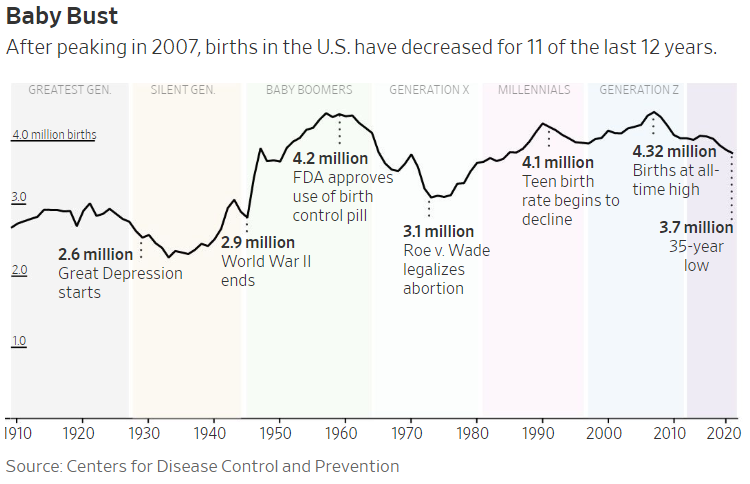US Births Hit 35-Year Low; Corona-Pessimism Could Ensure Permanent Japanification
Tyler Durden
Fri, 05/22/2020 – 22:45
The number of children born in the United States has hit a 35-year low, new federal data presents, suggesting America could sink to Japan-level numbers not just in capital markets but in a baby bust. The fresh data points to the great likelihood the post-Great Recession decline in births is to stay permanent.
“About 3.75 million babies were born in the U.S. in 2019, down 1% from the prior year,” WSJ summarizes of new stats from the Centers for Disease Control and Prevention’s National Center for Health Statistics produced Wednesday. “The general fertility rate fell 2% to 58.2 births per 1,000 women aged 15 to 44.” This is the “lowest level since the government began tracking the figure in 1909.”

Birthrates were down for all ages and races, especially the teen birthrate which has fallen a whopping 73% since it peaked in 1991, with the exception of women in their early 40s – where there was an uptick – suggesting that couples are waiting longer to start families.
“The total fertility rate — a snapshot of the average number of babies a woman would have over her lifetime — ticked down to 1.7 in 2019, a slight decline from the previous year [of 1.72] and another record low,” WSJ continues.
“In almost all years since 1971, that rate has been below the level of 2.1 needed for the population to replace itself, without accounting for immigration.”
“Women are still having children,” study co-author and statistician Brady Hamilton said. “They’re just holding off until a later point in time until they establish their education and establish their career.”
Given the economic fallout from the coronavirus pandemic, predicted to last over at least the next few years, the WSJ report forecasts a declining national birthrate similar to the period of the Great Depression.

On that point, The Hill also underscores that—
Since the recession, the birth rate has risen year-over-year only once, in 2014. Now, demographers tracking the declining birth rate say the trend is beginning to look like a longer-term pattern.
“The fact that births and fertility continued to decline in 2019 despite the booming economy suggests that this is a permanent shift to a lower fertility regime in the U.S.,” said Cheryl Russell, a demographer and contributing editor to the journal American Demographics.
It appears millennials, generally less financially secure than generations before, are on the whole moving much slower in establishing families.
Recall that in 2008 when Japan’s birth rate fell to 1.34 average number children a woman had in her lifetime, drastic social policies were undertaken on the realization of the long-term economic stagnation or worse would result if the trend weren’t immediately reversed (combined with the “super-aged” nation having over 20% of its population older than 65).
In 2008, Japan’s birth rate was so low that workers were told to go home early and use their remaining energy to procreate. pic.twitter.com/BTXPqLm5b7
— Fact Always (@factalwayz) May 19, 2020
In the early weeks of much of America going into lockdown amid widespread state and local ‘stay at home’ orders, there was much public discourse, jokes, and media expectation of a ‘quarantine baby boom’.
This is still a possibility of course, but most analysts predict the historic skyrocketing unemployment and negative long-term economic prospects will be the driving factor in continued low births.
via ZeroHedge News https://ift.tt/2A2eco1 Tyler Durden